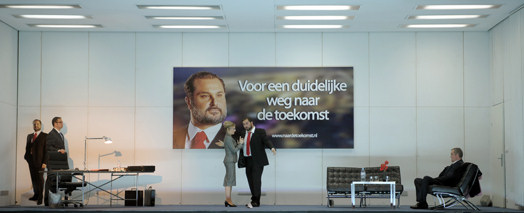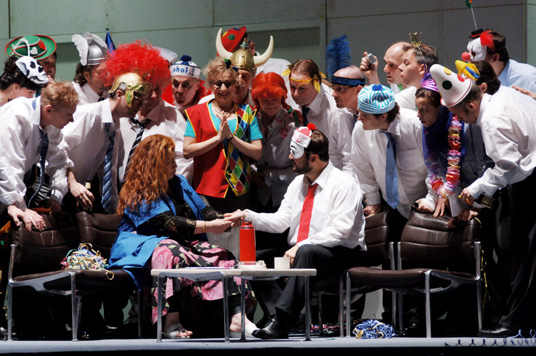Other Links
Editorial Board
- Editor - Bill Kenny
- London Editor-Melanie Eskenazi
- Founder - Len Mullenger
Google Site Search
SEEN
AND HEARD INTERNATIONAL OPERA REVIEW
Verdi, Un ballo in maschera : Soloists, Chorus of De Nederlandse Opera, Rotterdam Philharmonic Orchestra, Conductor: Carlo Rizzi, Het Muziektheater, Amsterdam, 10.4.2008 (PK)
Mixed thoughts about a 'political' Ballo
Production Director:
Claus Guth
Cast:
Roberto Aronica (Riccardo)
Andrzej Dobber (Renato)
Tatjana Serban (Amelia)
Rosemary Joshua (Oscar)
Marianne Cornetti (Ulrica)
Thomas Oliemans (Silvano)
Friedemann Röhlig (Samuel)
Konstantin Gorny (Tom)
Ruud Fiselier (Un giudice)
Robert Koops (Un servo di Amelia)

Rosemary Joshua (Oscar), Roberto Aronica (Riccardo), Andrzej
Dobber (Renato)
Negligence
When Claus
Guth created his 'actualised' production of Verdi's
Un ballo in maschera in Frankfurt in 2005 , he changed Riccardo from
an English governor in 17th century Boston into a modern European
politician who just had won the elections. Renato became his
'second man', the page Oscar his secretary and the fortune-teller
Ulrica a Mediterranean cleaning lady. Apparently the fact that
many details in the libretto became quite ridiculous, did not
bother him very much, and at the same time his realisation
was not free of anachronisms : in modern society, especially after
9/11, it is unthinkable that a jubilant or protesting crowd can
march into governmental building without being withheld by the security service. But what
else should we expect from a producer who once
told a singer 'not to mind the text'? One thing however is
undeniable: Guth created a strong theatrical performance with
surprising contrasts. Sometimes his humour may be a little bit too
childish or too strong in combination with the subtleness of
Verdi's score, but this too is in line with his apparent
negligence of text and music.

Marianne Cornetti (Ulrica), Roberto Aronica (Riccardo), Chorus of
De Nederlandse Opera
Longing for
'chiaroscuro'
On the
musical side much of the credit went to Carlo Rizzi. His
conducting, although somewhat lacking in dramatic tension, was one
continuous display of all the subtleties Verdi has hidden in his
score. The combination of light and dark colours became especially
evident in the playing of the lower strings and the woodwinds of
the Rotterdam Philharmonic Orchestra, that underlined some well
paced climaxes. On the first night, April 10th, the singing was not
as excellent as could have been. As Riccardo the tenor Roberto
Aronica displayed an open, 'Italian' singing that readily earned him a warm reception after his first solo, but during the next
scene something went wrong and his voice lost all its steadiness.
In the third scene his singing was more controlled again, but he
wisely decided to be more careful during the remainder of the
evening.
The Russian soprano Tatjana Serjan may not be the possessor of a
real 'Verdi soprano' with the broad middle register that
the love duet
asks for. At that point she even sounded somewhat shrill, an
effect partly due to her high intonation, but the pure vocal
lines in the 'chamber scene' (here partly in some sort of
dollhouse, partly in the garden) and especially the intensity of
her 'Morrò' were impressive. The singing by the Polish baritone
Andrzej Dobber may be a little too lyrical for a dramatic role as
Renato, but his involved and stylistic singing completely captured
the audience and overcame even the silliness of the staging.
After her most charming Cleopatra in Giulio Cesare last
month, Rosemary Joshua returned to Amsterdam as Oscar, in this
production a lively secretary, but not always with the champagne
in her singing the music asks for. As Ulrica the American
mezzo-soprano Marianne Cornetti was not only steady as a rock, but
she also gave us the most colourful 'Italian singing' of the
evening. For the conspirators Samuel and Tom, the Netherlands
Opera had engaged Friedemann Röhlig and Konstantin Gorny, two
light bassos who played the clown very well, but their singing
lacked the combination of sarcasm and threatening that should mark
the end of the second act. During the whole performance one was
longing for Verdi's 'chiaroscuro', a Rembrandt-like playing with
all shades of dark and light that makes this score so fascinating.
Paul Korenhof
Pictures © Monika Rittershaus
The distinguished Dutch music critic, writer and broadcaster
Dr. Paul Korenhof is author
of several books and a regular contributor to opera journals and
magazines. He presents his own weekly radio programme and
teaches music drama and literature at high school and university
levels.
Dr. Korenhof's Dutch language version of this review appears in
the online review magazine
Opus
Klassiek
Back
to Top
Cumulative Index Page
